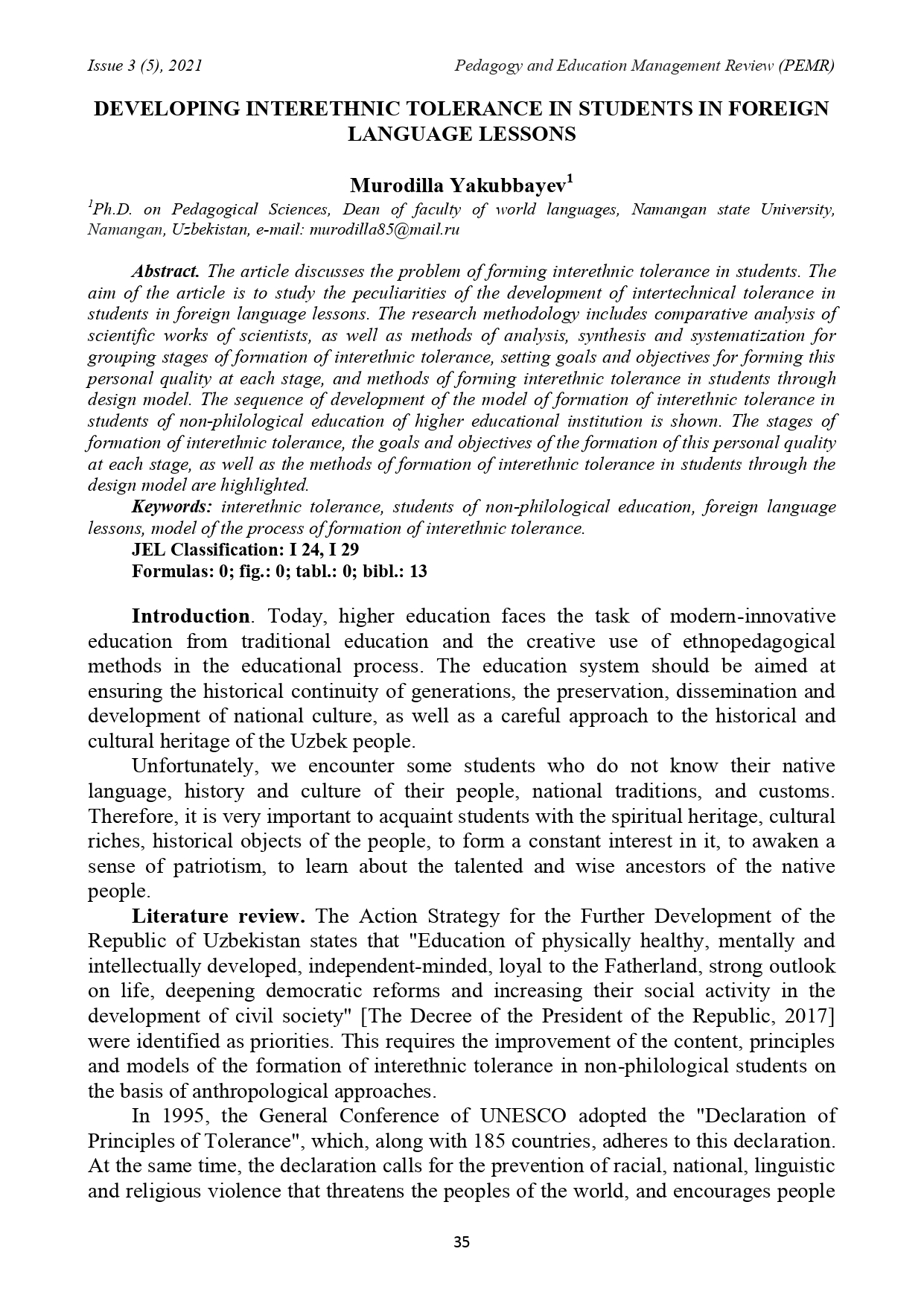DEVELOPING INTERETHNIC TOLERANCE IN STUDENTS IN FOREIGN LANGUAGE LESSONS
DOI:
https://doi.org/10.36690/2733-2039-2021-3-35Keywords:
interethnic tolerance, students of non-philological education, foreign language lessons, model of the process of formation of interethnic toleranceAbstract
The article discusses the problem of forming interethnic tolerance in students. The aim of the article is to study the peculiarities of the development of intertechnical tolerance in students in foreign language lessons. The research methodology includes comparative analysis of scientific works of scientists, as well as methods of analysis, synthesis and systematization for grouping stages of formation of interethnic tolerance, setting goals and objectives for forming this personal quality at each stage, and methods of forming interethnic tolerance in students through design model. The sequence of development of the model of formation of interethnic tolerance in students of non-philological education of higher educational institution is shown. The stages of formation of interethnic tolerance, the goals and objectives of the formation of this personal quality at each stage, as well as the methods of formation of interethnic tolerance in students through the design model are highlighted.
Downloads
References
The Decree of the President of the Republic of Uzbekistan dated February 7 , 2017 “On the Strategy of actions for Further Development of the Republic of Uzbekistan” № PD-4947 // The Law of the Republic of Uzbekistan. №6 (766), Article 70 (766)]. Tashkent, 2017. Pp.25-150.
Saidov, A. (ed) (1999), the Declaration of principles of tolerance [Declaration about Independence adopted in the main assembly of the 28th session of the UN]. Tashkent:UNESCO.
Djurayev R. (ed) Dictionary of pedagogical terms (2008) Tashkent: Fan.
Mirzaev T. (ed) Definition dictionary of Uzbek language. Tashkent: National Encyclopedia of Uzbekistan.
Sultonov Kh. (ed) Spirituality (2010) Cultural basis definition. Tashkent: Literature and Art Publishing House, named after G.Gulyam].
Judy E.U. (2008) The forming of ethical tolerance in policulture. Siberian pedagogical magazine. No. 4. Pp. 237 - 243.
Bespalko V.P. (1989) Terms pedagogical technologies. Moscow: Pedagogy.
Kruteckij V.A., Lukin N.S. (1965) Psychology of adolescents. Moscow: Prosveshhenie.
Ilin V.S. (1984) Forming personalities of schoolchildren. Moscow: Pedagogy.
Serikov V.V. (1994) Personality of middle education. Pedagogy. No5. Pp.16 –21.
Kirjakova A.V. (2011) Axiological paradigm of modern University education. Vysshee obrazovanie segodnja. No 1. Pp.19-21.
Krysin L.P, Diligenskij G.G. (2001) [Economic-language-culture (discussion)]. Obshhestvenne nauki I sovremennost. No. 5. Pp. 48 - 57.
Klepcova E. (2008) Child intolerance. Doshkol'noe vospitanie. No. 7. Pp .78-81.






